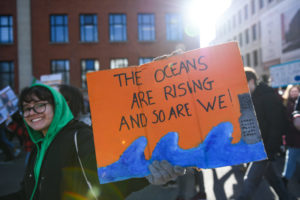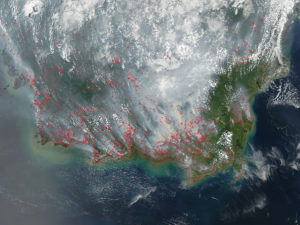As surprising as it might sound, volunteer firefighters are changing the way Russians feel about Greenpeace. Their work fighting peat bog fires in the Tver region prompted Yulia Latynina, a Russian journalist, to call “the guys from Greenpeace” “environmental enthusiasts” just a year after accusing them of spreading “anti-science hysteria” and “mass intimidation.” Every fire they extinguish opens up the possibility for conversation and understanding in the affected community.
More than 90 percent of wildfires in Russia are caused by humans, and that is where Greenpeace hopes to enact change by educating locals about the dangers of dry vegetation burning. Anton ‘Benny’ Beneslavskiy, who helps coordinate the Boreal Forest and Wildland Fire Program, tells MobLab that locals are often initially mistrustful of the volunteer firefighters.
“Traditionally firefighting is considered some governmental activity,” Beneslavskiy explained. “Volunteers are second tier…we must show our professionalism and our skills.”
We work in those situations when the state is not available to help, and it changes the opinion of the local communities when they see our work. We try to communicate with people just after we stop work, to explain why it happened, what the threat was. As it is a very emotional moment for the locals they listen to us.
– Anton ‘Benny’ Beneslavskiy, Greenpeace Russia
In regions they have worked time after time (in 2014 alone they have fought fires in Astrakhan, Chita, Moscow, Saint-Petersburg, Ladoga lake, Smolensk, Tver, and Ryazan), the Wildland Program organizes roundtables and conferences where they can speak to community leaders and organizers.
Obstacles and Opportunity
The Wildland Fire Program, which has been running since the spring of 2010, still faces a fair number of obstacles and challenges. Beneslavskiy explains wildfires are a difficult topic for Russian media because the authorities try to refute the number of fires.
“This is the second focus of our campaign,” Beneslavskiy said. “To be the witnesses of the real situation, to describe it and disclose it.”
Another challenge is accomplishing as much as possible with few resources. The volunteer firefighting program only has two staff members, the program head and an assistant. Technically, Beneslavskiy is in the Boreal Forest program, along with two others. They oversee 20 – 30 active volunteers every year, but they have 200 reserve volunteers who have been trained and participated in previous seasons, but are no longer active because of work or familial duties. In case of a true disaster, the reserve volunteers could be called upon to mobilize. However, day-to-day firefighting activities are limited by the hours and days volunteers are available.
They keep in touch with reserve volunteers online through social media accounts on Facebook, LiveJournal and VK (formerly Vkontakte), invite them to meetings and online discussions, and encourage them to join in other Greenpeace activities.
Finally, there is the physical and mental toll firefighting can take on volunteers. “First of all firefighting or fire reconnaissance is risky,” Beneslavskiy said, “you need very strict safety rules and discipline, [which is] maybe not the strongest side of Greenpeace.”
“Toward the end of the summer our volunteers and staff are tired,” he added. “Some are volunteers who faced huge fires, and our work doesn’t happen in a second. They could be frustrated by the scale of the wildfires.”
Firefighting is generally not the first thing that comes to mind when one thinks about Greenpeace—in fact Beneslavskiy said other Greenpeace members look down upon their work—but he has found that firefighting projects attract people who as yet do not support Greenpeace, and ultimately improve the organization’s image.

The fire program has 20 – 30 active volunteers each year and 200 reserve volunteers who have been trained and participated in previous seasons. Social media keeps volunteers updated.
Update – Elena Vazhenkova at Greenpeace Russia sent an update on 3 October, 2014, about a successful crowdfunding campaign to support the volunteer firefighting program:
I want to add that our firefighting project is loved so much by our supporters (and helps to find new donors). And this year before the start of the “firefighting season” we made a big fundraising/crowdfunding project to raise 1 million Russian rubles (aprox $20,000 US) for our brave team. Here is the link to our platform. This 1 million should help buy a special car, clothes and equipment. We made e-mail, telephone and post appeals. Also cold e-mails, social media, banners on big media. The project was also supported by couple Russian celebrities. We raised this million, bought everything we needed and everybody was very happy!
Stay Connected
Categories:
tech, tools and tactics



